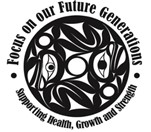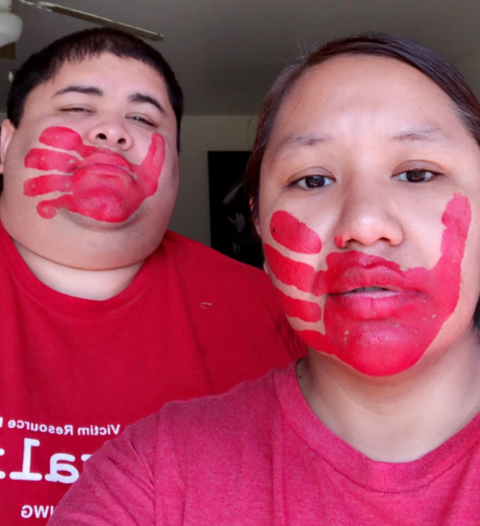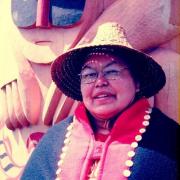Tribal prevention and wellness programs
The Division of Behavioral Health and Recovery (DBHR) administers state and federal funding to provide training and support to all 29 Federally Recognized tribes in Washington for implementing evidence-based, innovative, culturally appropriate and relevant programs to prevent adolescent use of alcohol, marijuana, and other drugs.
Tribes enters into agreements known as the Indian Nation Agreements with HCA’s Office of Tribal Affairs (OTA) to provide prevention programs that honor tribes' inherent right to design and operate culturally-relevant and appropriate programs on behalf of the population served.
Supported by government-to-government agreements, tribal prevention programs and strategies seek to change beliefs, attitudes, and behaviors in order to delay initiation and reduce use of alcohol, tobacco (other than for sacred practices or traditional ceremonies), cannabis, and other drugs. Programs are intended to increase protective factors of community connectedness and positive social bonding through cultural practices with a focus on positive Native American values.
How services are selected
Prevention services are chosen locally to meet each tribe’s needs, culture and traditions. Tribes develop strategies based on cultural and traditional teachings, available research or select evidence-based programs to best serve their members. Tribes develop an annual prevention program plan with the assistance of DBHR.
Prevention training with tribal focus
DBHR has supported multiple training opportunities for tribal members and prevention professionals working with Native American populations, such as participation in the National Prevention Network Conference and the Community Anti-Drug Coalitions of America (CADCA) National Youth Leadership Institute. DBHR has also supported multiple culturally specific Native American focused training opportunities, such as:
- Native American Substance Abuse Prevention Skills Training (SAPST) by the Center for Application of Prevention Technologies (Western CAPT)
- Natural Native Mentoring and Adverse Childhood Experiences (ACEs) by MENTOR Washington, Institute for Youth Success, Office of Superintendent of Public Instruction
- Incredible Years with focus on implementation in Tribal Communities by Incredible Years, Inc.
Tribal best practices
Resources for culturally-informed programs and strategies for American Indian and Alaska Native populations
- Substance use prevention and mental health promotion programs effective in tribal communities - Final report
- Substance Abuse and Mental Health Services Administration (SAMHSA) - Cultural approaches to prevention
- Prevention and mental health promotion programming for Washington State tribal communities presentation - May 21, 2018
- Final list of tribal prevention programs
- List of excluded tribal prevention programs
Results
Through the Tribal Prevention and Wellness Program, tribes have delivered 184 substance abuse prevention and mental health promotion programs and strategies in state fiscal year 2018. These strategies increase protective factors and reduce risk factors within tribal communities, including promoting peer and community bonding, increasing healthy beliefs and clear standards, addressing family management problems, and decreasing academic failure. Community-wide programs are in place to address laws favorable to drug use, low neighborhood attachment, and community disorganization.
- Tribe specific traditional activities and cultural education
- Gathering of Native Americans (GONA)
- DBHR’s The One Tribal opioid campaign
- Healing of the Canoe
- Incredible Years
- Life Skills Training
- Media campaigns to encourage safe storage of prescriptions and marijuana
- Project Success adaptations, such as Pulling for Success
- Positive Indian Parenting
- Question, Refer, Persuade (QPR)
- Second Step
- White Bison - Prevention curricula Youth Mentor Programs that include Elders
Tribal prevention and wellness program highlights
Squaxin Island Mural
The Squaxin Island Mural represents the four seasons and walking in balance. It hangs outside the youth center. The Squaxin community partnered with their community mobilization program to create this beautiful piece.

Tribal Substance Abuse Prevention Gathering
In partnership with Suquamish Tribe, the Division of Behavioral Health and Recovery (DBHR) supported a Tribal Substance Abuse Prevention Gathering in 2017 and 2018. The event invited tribal members and community partners to participate in training and networking opportunities to share successful and culturally appropriate prevention activities.
- 2018 Tribal Prevention Gathering agenda
- A native perspective: Neuroscience, epigenetics, adverse childhood experience study (NEAR), resilience and protective fators - Jan Ward Olmstead
- Making your action plan community ready - Vickie LaFromboise
- Tribal youth mentoring - MENTOR Washington and DBHR
- Lapwai Community Coalition
- Children of the Sun Prevention Coalition
- 2017 Tribal Prevention Gathering agenda
- DBHR Welcome and tribal prevention and wellness programs overview
- Prevention evolution: Culture as prevention
- Strategic Prevention Framework & native youth
- Fueling the future of youth through mentoring - Mentoring Works Washington and DBHR
- White Swan Arts & Rec. Community Coalition Dream Makers and Empowered Ideas - Ken Hoptowit
- Readiness building in the Quileute Community: Preparing to implement the Incredible Years Program - Ann Penn-Charles and Nicole Earls
- Family Spirit Home Visiting Program - Gaining Community Buy in to Implement Prevention Programs - Crystal Kee
- Tailored youth marijuana prevention marketing - Josephine Keefe and Helen Goodteacher
Washington State Prevention Awards of Excellence
Each year at the Prevention Summit, professionals, community members, youth, and coalitions are recognized for their exemplary contributions to substance abuse prevention, mental health promotion and the health of their communities. Below is a list of awardees who work with tribal communities in Washington. Find out more about the Prevention Awards of Excellence and how to nominate someone on the Prevention Awards page.
|
2021 Tribal and Urban Indian Prevention Professional |
Joe Hipp All Nations Foundation |
|
|
2020 Tribal and Urban Indian Prevention Professional |
Larry Jackson, Sr. Quileute Tribal Member |

|
|
2020 Community Prevention Coalition |
Forks Coalition Ceciliajean Ashue and Phillip Sifuentes |

|
|
2020 Implementation of Prevention Program |
Cowlitz Indian Tribe Healing of the Canoe Program |
The Cowlitz Indian Tribe’s Healing of the Canoe program has been implemented for over three years. It is a program that provides tools for youth in the Cowlitz tribal community to build resiliency and hope through culturally relevant curriculum, prevention tools, and methods. The program serves youth from middle school to high school. |
|
2017 Tribal Prevention Professional |
Kate Ahvakana Suquamish Tribal Member |
|
|
2016 Tribal Prevention Professional |
Steven Dorland Squaxin Island Tribal Member |
At the ti |
|
2015 Tribal Prevention Professional |
Ann “Miss Ann” Penn-Charles Quileute Nation Tribal Member |
|
Join our newsletter
Interested in staying up to date on Tribal prevention and wellness programs? Join the Athena prevention newsletter to receive notifications and updates. Click to subscribe.
Resources
- Health Care Authority - Office of Tribal Affairs
- Washington Tribal Opioid Solutions - DBHR opioid abuse and misuse prevention media campaign
- DBHR’s Washington’s Best Practices for Substance Abuse Prevention and Mental Health Promotion Guide
- Substance Abuse and Mental Health Services Administration’s (SAMHSA) Tribal Training and Technical Assistance (TTA) Center offers training and technical assistance (TTA) on mental and substance use disorders, suicide prevention, and mental health promotion using the Strategic Cultural Framework.
- Choosing programs for Tribal communities.
- Native Connections webinars guide grantees on steps toward reducing suicidal behavior and substance use among youth. Access pre-recorded webinars on assessing your community's needs, developing a strategic action plan, and more.
- The Native Wellness Institute exists to promote the well-being of Native people through programs and trainings that embrace the teachings and traditions of our ancestors. NWI has a wealth of experience and expertise working for tribal programs, tribal governments and working with hundreds of tribal nations throughout North America. They can provide an array of technical services relating to health and wellness programs, tribal governments and other tribal programs.
- SAMHSA’s Substance Use Disorders (SUD) Resource page will help you locate organizations, articles, and other resources that American Indian and Alaska Natives can use to promote healing from substance use disorders.
- Indian Health Service’s Methamphetamine and Suicide Prevention Initiative Best Practices in Use: Lists evidence-based and practice-based methamphetamine and suicide prevention interventions for Indian Country.
- Johns Hopkins’ Center for American Indian Health provides descriptions of tribal programs on a variety of topics, such as alcohol and drug abuse prevention, mental health, and adolescent health.
- National Indian Health Board’s Healthy Indian Country Initiative Promising Prevention Practices Resource Guide highlights 13 tribal, community-developed prevention programs that are considered promising practices for reducing and preventing disease in Indian Country.
- Suicide Prevention Toolkit: Resources for Tribes and Partners
- Northwest Portland Area Indian Health Board (NPAIHB) THRIVE - Tribal Health: Reaching Out InVolves Everyone suicide prevention resources.
Sonja Pipek
Tribal and CBO Services Supervisor
Sonja.Pipek@hca.wa.gov



 At the time of the award, Kate Ahvakana had contributed to prevention for seven years, managing cultural programs and activities for youth, including cultural camps and youth leadership programs. Kate was involved in the development and implementation of Holding Up our Youth, a life skill and drug and alcohol prevention Curriculum for the Suquamish Tribe. This was as part of the Healing of The Canoe, a collaborative project between the Suquamish Tribe, Port Gamble S’Klallam Tribe and University of Washington’s Alcohol and Drug Abuse Institute. Kate was instrumental in hosting and providing leadership on the first Tribal Prevention Gathering that took place in June 2017.
At the time of the award, Kate Ahvakana had contributed to prevention for seven years, managing cultural programs and activities for youth, including cultural camps and youth leadership programs. Kate was involved in the development and implementation of Holding Up our Youth, a life skill and drug and alcohol prevention Curriculum for the Suquamish Tribe. This was as part of the Healing of The Canoe, a collaborative project between the Suquamish Tribe, Port Gamble S’Klallam Tribe and University of Washington’s Alcohol and Drug Abuse Institute. Kate was instrumental in hosting and providing leadership on the first Tribal Prevention Gathering that took place in June 2017. me of the award, Steven engaged youth in culturally relevant activities that promote healthy behavior and positive interaction. He also used art and crafts to engage youth in anti-drug, anti-bullying and anti-alcohol activities. Steven was also key in planning the Chehalis Tribe Suicide Prevention Walk.
me of the award, Steven engaged youth in culturally relevant activities that promote healthy behavior and positive interaction. He also used art and crafts to engage youth in anti-drug, anti-bullying and anti-alcohol activities. Steven was also key in planning the Chehalis Tribe Suicide Prevention Walk. Miss Ann has worked in prevention for over 20 years and is a natural community organizer. As an enrolled member of the Quileute Penn-Payne Family (Lummi Humphreys-Paul Family/Muckleshoot of the Ross-Jack Family) of the Quileute Nation, Miss Ann understands the importance of comprehensive prevention planning and how to integrate prevention for her community to be culturally sensitive. At the time of the award, Miss Ann lead a group of youth on an annual substance-free Canoe Journey, connecting with other coastal tribes to build cultural awareness among youth. She organized a weekly Drum Circle to honor Quileute Tribal traditions that draws tribal members from neighboring Hoh and Makah Tribes. Miss Ann coordinated several healing and organizing groups in the community to further community connectedness.
Miss Ann has worked in prevention for over 20 years and is a natural community organizer. As an enrolled member of the Quileute Penn-Payne Family (Lummi Humphreys-Paul Family/Muckleshoot of the Ross-Jack Family) of the Quileute Nation, Miss Ann understands the importance of comprehensive prevention planning and how to integrate prevention for her community to be culturally sensitive. At the time of the award, Miss Ann lead a group of youth on an annual substance-free Canoe Journey, connecting with other coastal tribes to build cultural awareness among youth. She organized a weekly Drum Circle to honor Quileute Tribal traditions that draws tribal members from neighboring Hoh and Makah Tribes. Miss Ann coordinated several healing and organizing groups in the community to further community connectedness. 

